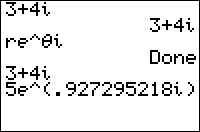TI-BASIC:Re Thetai: Difference between revisions
Initial automated import |
Automated internal link correction |
||
| Line 34: | Line 34: | ||
* [[TI-BASIC:Real_Mode|Real]] | * [[TI-BASIC:Real_Mode|Real]] | ||
* [[TI-BASIC: | * [[TI-BASIC:A_Bi|A+bi]][[Category:TI-BASIC]] | ||
[[Category:TIBD]] | [[Category:TIBD]] | ||
Latest revision as of 23:22, 24 February 2016
Command Summary
Puts the calculator into re^θi mode.
Command Syntax
re^θi
Menu Location
Press:
- MODE to access the mode menu.
- Use the arrow keys and ENTER to select re^θi
TI-83/84/+/SE
1 byte
The re^θi command puts the calculator into polar complex number mode. This means that:
- Taking square roots of negative numbers, and similar operations, no longer returns an error.
- Complex results are displayed in the form re^(θi) (hence the name of the command)
The mathematical underpinning of this complex number format is due to the fact that if (x,y) is a point in the plane using the normal coordinates, it can also be represented using coordinates (r,θ) where r is the distance from the origin and θ is the angle that the line segment to the point from the origin makes to the positive x-axis (see Polar and PolarGC for more information on polar coordinates and graphing). What does this have to do with complex numbers? Simple: if x+yi is a complex number in normal (rectangular) form, and re^(θi) is the same number in polar form, then (x,y) and (r,θ) represent the same point in the plane.
Of course, that has a lot to do with how you define imaginary exponents, which isn't that obvious.
An equivalent form to polar form is the form r[cos(θ)+isin(θ)].
Unfortunately, the calculator seems to have some confusion about the use of degree and radian angle measures for θ in this mode (the answer is: you can only use radians -- degrees make no sense with complex exponents). When calculating a value re^(θi) by using the e^( command and plugging in numbers, the calculator assumes θ is a radian angle, whether it's in Degree or Radian mode. However, when displaying a complex number as re^(θi), the calculator will display θ in radian or degree measure, whichever is enabled. This may lead to such pathological output as:
Degree:re^θi Done e^(πi) 1e^(180i) Ans=e^(180i) 0 (false)
It's recommended, then, to use Radian mode whenever you're in re^θi mode.
